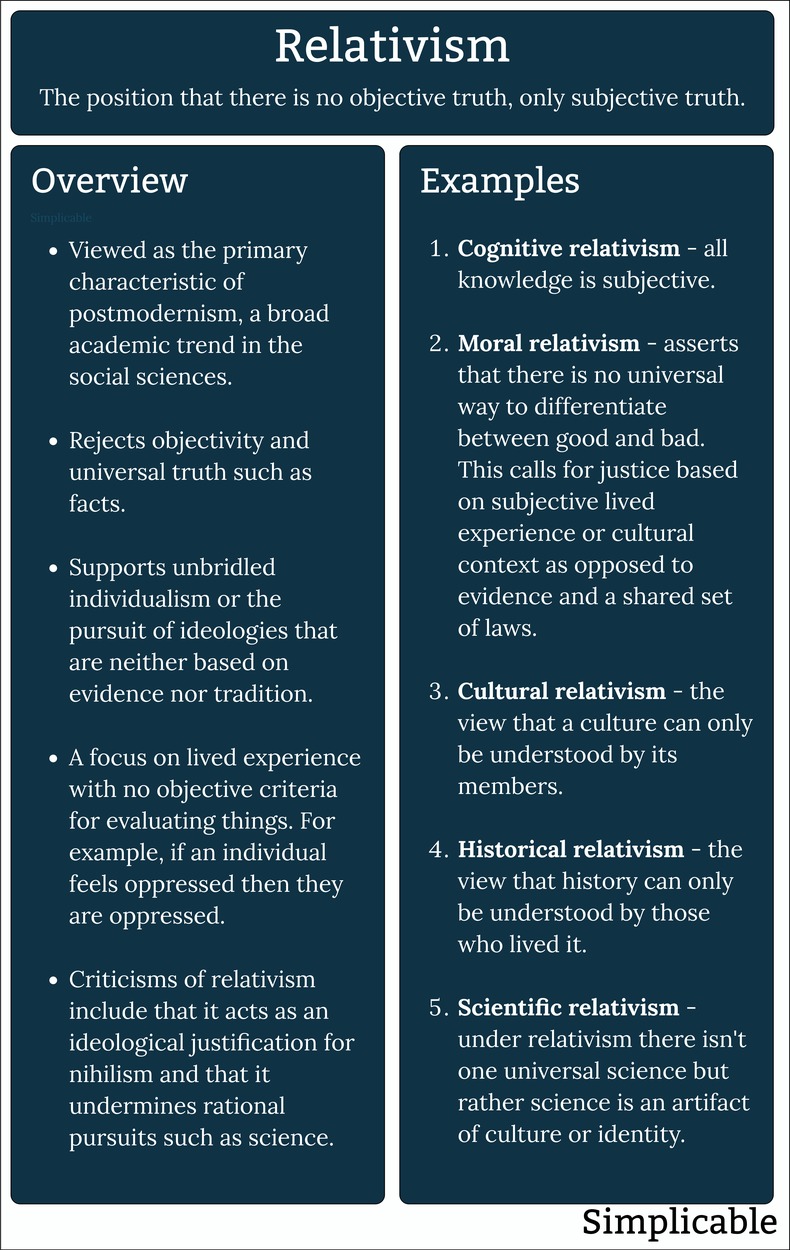Objectivity
We should challenge the relativism that tells us there is no right or wrong, when every instinct of our mind knows it is not so, and is a mere excuse to allow us to indulge in what we believe we can get away with. A world without values quickly becomes a world without value.Relativism rejects the idea of objective reality such that reality can only be defined in terms of the individual experience.
― Jonathan Sacks
Cultural Relativism
People often recommend relativism because they think it will lead to tolerance. But if we cannot learn from one another what it is right to think and feel and do, then conversation between us will be pointless. Relativism of that sort isn't a way to encourage conversation; it's just a reason to fall silent.Relativism calls for interpreting all things from the perspective of their cultural context such that what is true in one culture isn't true in another.
― Kwame Anthony Appiah
Unbridled Individualism
It is reasonable to love the absolute absolutely for the same reason it is reasonable to love the relative relatively.A stricter interpretation of relativism makes no provision for culture as everything can only be interpreted by individuals such that the values of groups are viewed as oppressive structures as opposed to truths. Relativism frees the individual to define the universe and ignore any external information or argument.
― Peter Kreeft
Historical Relativism
That men do not learn very much from the lessons of history is the most important of all the lessons that history has to teach.Historical relativism is the idea that history can't be understood objectively such that their is no way to extract shared knowledge from it.
― Aldous Huxley
Facts
I do not want to drive across a bridge designed by an engineer who believed the numbers in structural stress models are relative truths.Facts are largely viewed by relativists as a viewpoint that is imposed by a controlling elite and their systems. This is the reason that postmodernism hasn't gained much traction in hard science and engineering as objective fact is quite important to these domains.
― R.C. Sproul
Logic
Relativism reduces every element of absoluteness to relativity while making a completely illogical exception in favor of this reduction itself.Relativism can be viewed as the argument that the only universal truth is that their are no universal truths. This is a paradoxical statement that can be shown to be a fallacy. Also paradoxically, relativists may not care because they don't view systems such as logic as universally valid.
― Frithjof Schuon, Logic and Transcendence
Justice
If there is no objective morality then love is no better than murder.Relativism complicates justice. For example, if someone feels that they were wronged then they were wronged as relativists believe objective right and wrong don't exist.
― Frank Turek
Morals, Ethics & Religion
The modern habit of saying "Every man has a different philosophy; this is my philosophy and it suits me" – the habit of saying this is mere weak-mindedness. A cosmic philosophy is not constructed to fit a man; a cosmic philosophy is constructed to fit a cosmos. A man can no more possess a private religion than he can possess a private sun and moon.Universal truths are the basis of morals, ethics and religion. As such, relativism would suggest that these things can only exist at the level of the individual or culture.
― G.K. Chesterton
Skepticism
... that is in reality what happens to relativists: In claiming to be too lowly to know the truth, they exalt themselves as supreme arbiter of what they can think and do. This is not humility. This is the essence of pride.In some cases, relativism is supported by the notion that if universal truths do exist they are unknowable. This is based on extreme skepticism whereby people can't trust their senses or measurements because these are all products of individual perception as opposed to universal reality.
― John Piper
Civility
A rejection of absolutism, in all its forms, may sometimes slip into moral relativism or even nihilism, an erosion of values that hold society together, but for most of our history it has encouraged the very process of information gathering, analysis, argument, and persuasion which allows us to make better, if not perfect, choices – not only about the means to our ends, but also the ends themselves.Relativism is ideally designed for knocking down systems, knowledge and debate as it simply claims that everything an individual feels and thinks is as true as anything else. This may support the feeling that each individual has the right to enforce their own personal philosophy in their dealings with society. It is unclear exactly how this is supposed to work as it would appear contrary to knowledge, communication, civility, shared experience and cooperation of any kind. Relativism is commonly used as a device of criticism, change and revolution.
― Barack Obama
Ideology
Communism has never concealed the fact that it rejects all absolute concepts of morality. It scoffs at any consideration of "good" and "evil" as indisputable categories. Communism considers morality to be relative, to be a class matter. Depending on circumstances and the political situation, any act, including murder, even the killing of hundreds of thousands, could be good or could be bad. It all depends on class ideology. And who defines this ideology?Relativism has been associated with a number of ideologies of both the distant left and right. It was used by Benito Mussolini as the philosophical justification for Fascism. For example, he wrote "From the fact that all ideologies are of equal value, we Fascists conclude that we have the right to create our own ideology and to enforce it with all the energy of which we are capable."
― Alexander Solzhenitsyn
Summary
The position that there are no universal truths, only subjective or cultural interpretations. Viewed as one of the defining features of academic postmodernism.
| Overview: Relativism | ||
Type | ||
Definition (1) | The idea that there are no universal truths. | |
Definition (2) | A device of criticism, change and revolution that asserts that an individual's ideas are just as valid as those of a society, science or tradition. | |
Definition (3) | The theory that individual reality such as personal ideas, philosophies and emotions are as true as anything else without any need of justification or debate. | |
Definition (4) | The skeptical theory that everything is unknowable such that all ideas are equally uncertain. This dismisses the very idea of objective truth such that an individual's passing thought is just as valid as a well accepted theory supported by evidence and review. | |
Related Concepts | ||














































